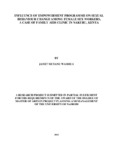| dc.description.abstract | This research sought to examine how a specific empowerment program influenced
sexual behavior change among female sex workers enrolled at the Family AIDS
Initiative Response Clinic that is based in Nakuru County in Kenya. The objectives of
this study were drawn from approaches that the empowerment program used to help
the enrolled sex workers. These objectives include; capacity building, support through
small and medium enterprises, outreach and agricultural-based support activities.
Despite rapid growth in empowerment programs in Kenya as well as the ballooning
number of agencies dealing with empowerment and rural development, the impact of
such programs and projects on sexual behavior change especially on female sex
workers has not been given sufficient attention in most empirical literature studied.
This study was therefore guided by four objectives derived from strategies employed
by the program under study. Empirical literature of the works of widely published
scholars was reviewed. The study was hinged on two models namely; social cognitive
behavior theory and the theory of change. The nexus between study variables was
demonstrated by a conceptual framework that exemplifies interrelationships between
variables. The study adopted a descriptive survey design with a target population of
150 respondents. Using the Krejcie and Morgan table for determining sample size,
108 respondents were sampled for this study. To achieve a desired representation,
simple random sampling was used in selecting respondents. A questionnaire
with a 5-point Likert scale was constructed and used to collect the required data. Data
obtained was analyzed using SPSS Version 21.0. Quantitative data was analyzed by
making inferences from the expressions and opinions of the respondents around the
variables and presented descriptively to make inferences. Instrument’s validity was
determined by using construct’s validity while reliability was determined by using the
Cronbach-Alpha Coefficient. Pilot testing of the questionnaire was done 2 weeks prior
to the main study. It is hoped this study would generate vital information and add to
the pool of knowledge to the ever-expanding discipline of program evaluation. From
the multiple regression findings, a unit change in capacity building led to 1.000 unit
increase in sexual behavior change. A 1.000 unit increase in support by SMEs also led
to 1.076 increases in sexual behavoiur change. The findings also indicated that there
was a highly significant relationship (with t statistic p value <0.023 < 0.05) between
capacity building and sexual behavoiur change among female sex workers. Again, the
same findings also indicated that there existed a highly significant relationship (with t
statistic p value <0.0015 < 0.05) between support through SME’s and sexual behavior
change among female sex workers. However there seemed to exist no significant
relationship between outreach activities and sexual behavior change at (p = 0.220 >
0.05) and between agricultural activities and sexual behavior change with (p = 1.000
> 0.05). In conclusion therefore, the researcher observed that there existed highly
significant relationships between capacity building and support through SME’s
against sexual behaviour change in female sex workers, while there existed no
relationships between outreach and agricultural activities against sexual behavoiur
change amongst female sex workers enrolled at family AIDS initiative clinic. On this
basis, the researcher recommends that a comprehensive study be undertaken to find
out the joint influence of capacity building and micro and medium enterprises on
sexual behavior change among female sex workers elsewhere in Kenya. | en_US |

